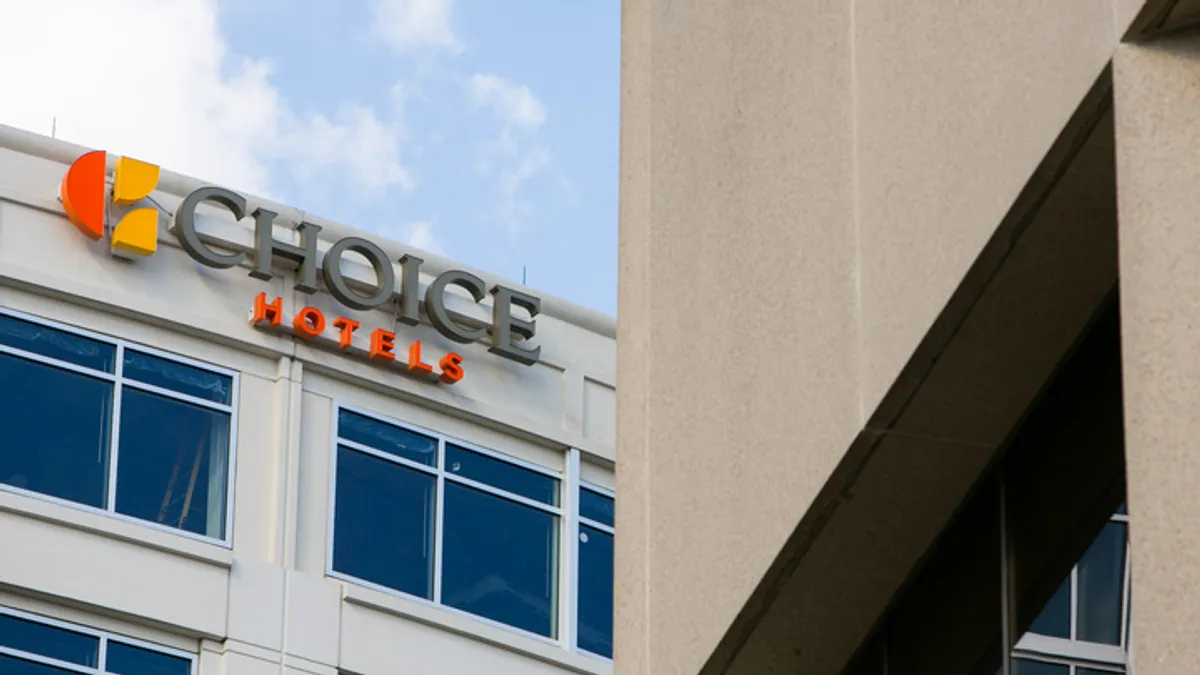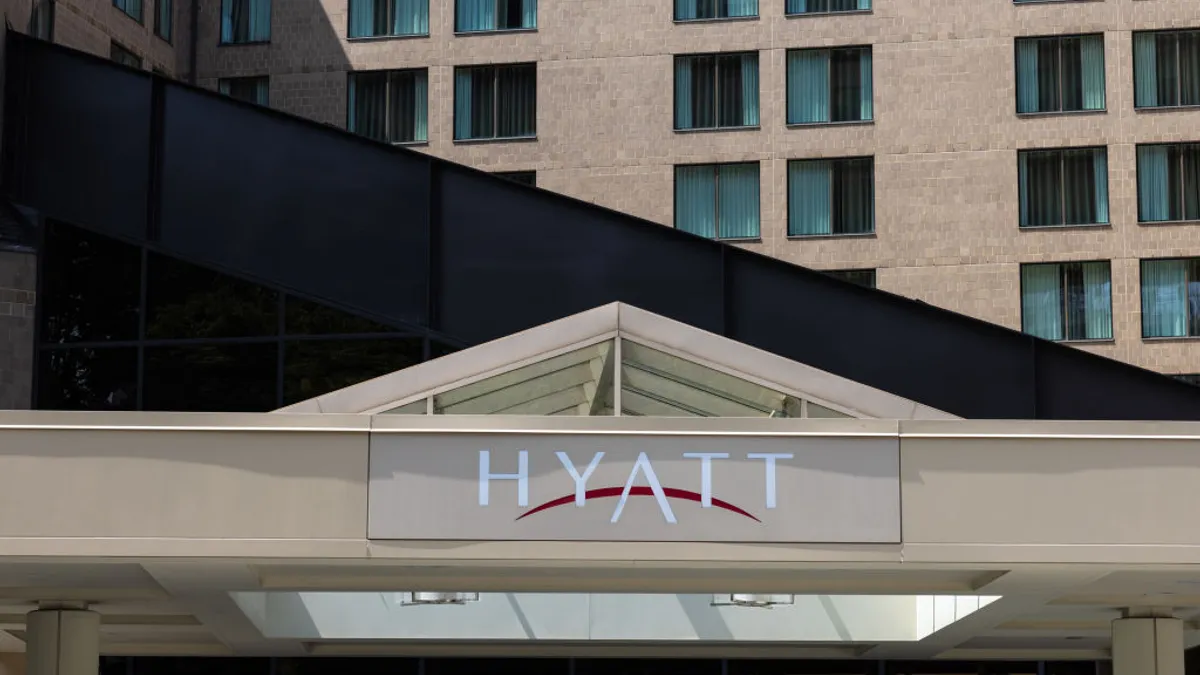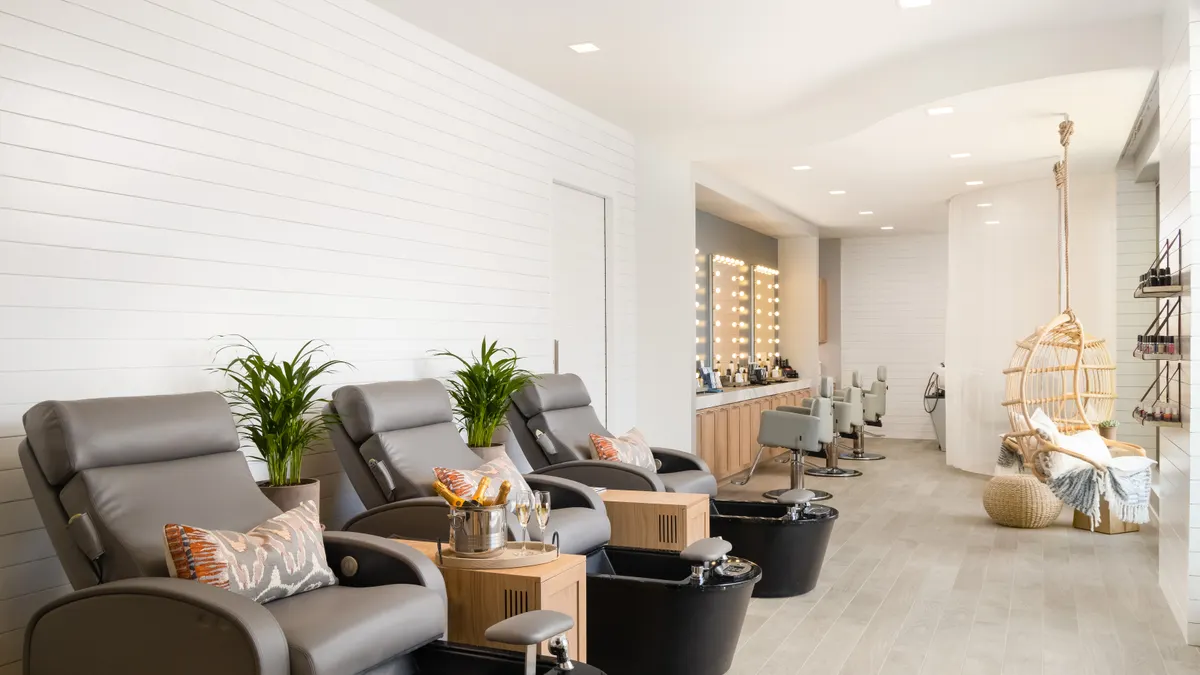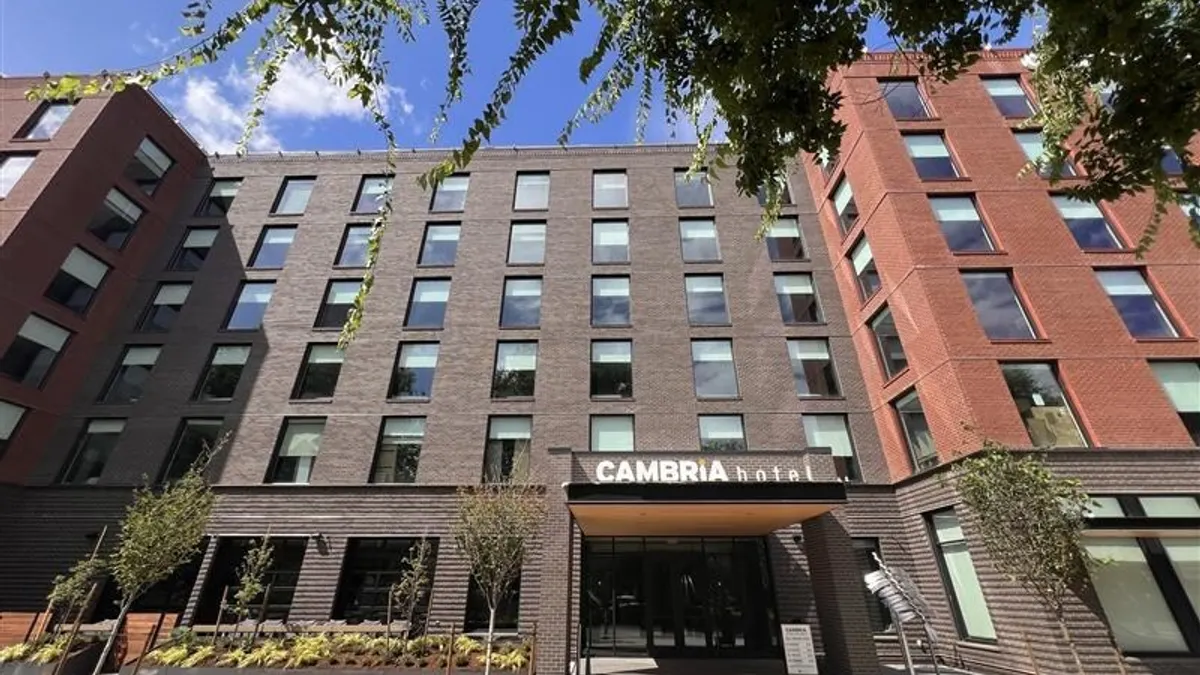When rumors broke in May that Choice Hotels International and Wyndham Hotels & Resorts were in merger negotiations, many hotel industry professionals were left shocked and, in some cases, in disbelief that a combination between the two economy segment giants was actually in the works.
It was and had been before. But this time, something was different.
Choice was particularly motivated to move the deal forward, so much so that it saw no other recourse than to take its bid public after Wyndham disengaged from several months of private discussions, many of which have now been made public.
When Choice’s $7.8 billion takeover bid dropped in October, industry experts called the move “hostile.” Sources familiar with the matter told Hotel Dive the deal has been nothing short of hostile from the start, even likening the initial spring negotiations to being held at gunpoint.
Choice showed up in April “with a gun sticking out of their pocket,” asserting that if Wyndham did not accept the deal, Choice would “take it to the shareholders,” sources familiar with the matter claim.
The entire situation is “puzzling,” according to those sources, especially given this now-public deal follows years of private, seemingly cooperative, discussions around a Choice-Wyndham combination.
Some hotel industry professionals, though, have ideas on why now is the time for consolidation and why Choice is pushing to make it happen.
Two decades of talks
Consolidation between Choice and Wyndham has been on the table for more than two decades.
During a third-quarter earnings call a few weeks after Choice first made its offer public, Non-Executive Chairman of the Wyndham Board of Directors Stephen Holmes told investors and analysts that Choice had approached Wyndham “multiple times over the years” proposing a combination, though nothing had come of the private discussions.
Sources familiar with the matter confirmed to Hotel Dive that over the last 25 years the idea of the two companies combining has been “intermittently discussed.”
Some of those discussions were Wyndham talking about buying Choice, and other times, Wyndham leaders discussed combining the two companies in a stock-for-stock merger, sources familiar with the matter said. Choice declined Hotel Dive’s request to comment on these claims.
There have been “plenty” of times that the companies have asked themselves if a deal would make sense, sources familiar with the matter said, adding that there has never been a question about a certain “industrial logic,” or business sense, backing the merger.
Choice has said in its public statements that a merger would lower ownership costs and increase profitability for franchisees, as well as enable superior value creation for shareholders.
However, concerns over whether the deal could gain regulators’ approval and close after a review process that could span up to two years — as well as the price — have kept Wyndham from engaging further, sources say.
From the start of the deal at stake, Wyndham's stance has remained unchanged: Its shareholders are undervalued, with Wyndham able to deliver value “well in excess” of any acquisition price that Choice has offered so far, and antitrust risk is real.
How negotiations played out
This deal has been in the works for roughly 10 months, according to two separate written timelines outlining Choice and Wyndham’s negotiations, published respectively by the companies’ information channels. Furthermore, Choice published several letters it sent to Wyndham in the early stages of their communications, which Hotel Dive has also reviewed.
Choice Hotels-Wyndham merger negotiations
-
April 28Choice President and CEO Patrick Pacious sends Wyndham’s board of directors a letter stating the company’s interest in acquiring its peer, offering $80 per Wyndham share.
-
May 9Wyndham writes back rejecting Choice’s offer.
-
May 15Choice makes a counteroffer, proposing $85 per share, with 55% of the consideration in cash and the remainder in Choice stock. Choice also offers the “opportunity” for Wyndham to appoint two mutually agreed upon independent directors to the combined company’s board.
Nowhere in Choice’s first or second offer letter does the company voice intent to take the parties’ discussions public.
However, after Wyndham rejects Choice’s updated offer on May 29 — claiming the offer is driven by opportunistic timing for Choice, among other concerns — Choice changes its tactics.
-
May 31In another letter to Wyndham, published by Choice, Pacious asserts Choice would be “left with limited alternatives” if Wyndham refused to engage in good faith discussions regarding the proposed transaction.
Pacious further requests Wyndham's board engage with Choice “constructively and without delay” to avoid “unnecessary costs and distraction.” Holmes, Wyndham’s non-executive chairman, later during the company’s third-quarter earnings call dubs Choice’s public proposal an “amazing distraction.”
-
June 22Choice and Wyndham board chairs and CEOs meet in person to discuss the transaction.
-
Aug. 14Choice's chairman calls Wyndham's chairman and provides a third verbal offer, upping the bid to $90 per share.
-
Aug. 17Choice and Wyndham board chairs meet in person again to discuss the transaction, and Wyndham expresses concerns about the proposal, including regulatory risks.
-
Aug. 21Pacious sends a letter to Wyndham’s board again expressing Choice’s desire to strike a deal at the $90 per share price.
In the month that follows, Choice and Wyndham board chairs, along with each of its respective financial and legal advisors, continue engagement. This includes a telephone meeting on Sept. 5.
-
Sept. 27Wyndham rejects Choice’s offer and makes its intent to disengage from future discussions on the proposed merger clear.
-
Oct. 17Choice makes its bid to acquire Wyndham public, after which a flurry of public back-and-forth discussions between the companies takes place.
Both Choice and Wyndham comment on the proposed merger during their third-quarter earnings calls, and on Dec. 12, Choice makes an exchange offer to Wyndham, which its peer rejects. Choice also announces it is preparing to nominate directors to Wyndham’s board, a move that would skirt current Wyndham leadership.
On Jan. 22, Choice does just that — proposing eight individuals who will stand for election at Wyndham’s annual shareholders meeting. Later that day, Wyndham condemns the nominations and again asks shareholders to not tender their shares.
Choice’s race to gain scale
Sources familiar with the matter say they are puzzled by Choice’s decision to take its offer public in the current environment — but they’ve speculated on why.
One source told Hotel Dive that they think Choice’s urgency to close the deal is based on “desperation,” saying Wyndham’s organic rooms growth is doing great, while Choice’s is below zero.
In Wyndham’s third-quarter earnings call, Holmes expressed a similar sentiment, saying the deal offered “a medicine cabinet full of remedies” for Choice’s lack of organic growth.
Wyndham’s system-wide rooms grew 3% year over year in the third quarter of 2023, according to the company’s earnings report. Choice declined to share its organic rooms growth for the same period with Hotel Dive, and the company’s Q3 earnings report does not highlight this information. Instead, it highlights a 6% sequential growth in Choice’s global rooms pipeline.
Choice Chief Segment and International Operations Officer Raul Ramirez told Hotel Dive that Choice made several moves in 2023 that signal the company's healthy growth: the renewal of a strategic master franchise agreement with Strawberry, formerly known as Nordic Choice, and the launch of new brands in existing and new territories, including Ascend Hotel Collection in Japan; Sleep Inn in Europe, the Middle East and Africa; and Radisson brands across the Americas.
But Holmes also claimed during Wyndham’s third-quarter earnings call that Choice was looking to remedy a “less-vibrant loyalty program and virtually no international capabilities” with the proposed merger. The Wyndham Rewards loyalty program has approximately 105 million members, while Choice Privileges has roughly 63 million, according to 2023 press releases from both companies.
Choice Hotels' loyalty program lags behind Wyndham's by roughly 42 million members
If the merger were to happen, it would create one of the largest budget hotel owners in the U.S., with nearly 17,000 hotels worldwide, The Wall Street Journal reported in May. The merged company would also have a loyalty program with roughly 165 million members, nearing industry leader Marriott’s roughly 186 million-member program.
According to Ramirez, loyalty helps propel Choice’s global and enterprise strategy forward.
“Choice Privileges drives a higher number of more profitable guests to hotels across our entire system,” he said. “The more engaged members are, the higher likelihood of them booking direct and booking more often.”
Online travel agencies gain control
It’s increasingly important for hotels to secure direct and repeat bookings so they don’t have to pay the rising commission costs charged by online travel agencies, which are simultaneously gaining scale and capturing a higher share of bookings, Max Starkov, hospitality consultant and adjunct professor at NYU's Tisch Center of Hospitality, explained.
According to a January report by SHR Group, a technology and service provider for the hotel sector, a recent influx of marketing spend from OTAs is reducing hotels’ share of direct bookings.
The share of reservations represented by direct bookings fell from 39% to 38% in 2023, the report found. This is equivalent to approximately 7.8 million global reservations in 2023 when applied to the worldwide hotel market, according to the report.
“This is a turning point for the hospitality industry,” Rod Jimenez, CEO of SHR Group, said in a statement. “The race to bring guests into loyalty programs and win greater influence over how and where they shop for travel, possibly for the rest of their lives, is becoming much more intense.”
For hotels that can’t capture direct and repeat bookings, they are paying a higher cost — literally.
Typically, an OTA — like Expedia Group’s flagship Expedia.com — will charge hotels a commission rate of from 15% to 30% of the total booking value for each reservation made through its platform. Starkov said this cost is usually higher for independent hotels and lower, though not nonexistent, for branded ones.
“One of the benefits of belonging to a larger brand is we can negotiate better terms through the [online travel agencies],” Choice’s Pacious previously told The Wall Street Journal, in reference to the company’s proposed acquisition of Wyndham. “This deal should be music to the ears of our franchisees.”
Ramirez shared that part of Choice’s global strategy is to ensure its properties “continue to have access to favorable commission rates” while the company works to drive an increased percentage of direct bookings through ChoiceHotels.com globally.
Additionally, Starkov said, because of rising OTA commission costs and other operational challenges, it’s becoming increasingly desirable for independent hotels globally to convert under the major hotel brands. In the U.S. alone, the share of independent hotels went from roughly 66% in 1990 to less than 40% in 2019, according to CoStar.
A Choice takeover of Wyndham would help it better compete with peers like Marriott International, IHG Hotels & Resorts and Hilton to gain market share of the increasing number of independent hotels converting under brands, Starkov noted.
The antitrust of it all
Competition in the marketplace could hinder the deal. Sources familiar with the matter told Hotel Dive that Choice’s decision to take its bid public has made the antitrust situation “infinitely more complicated.”
If the merger were to happen, it would create the largest U.S. provider of hotel franchise services in the economy and midscale chain scales, with more than 55% market share in each, according to a Dec. 18 press release by Wyndham, distributed in response to Choice’s public exchange offer.
“We believe that the merger of Choice and Wyndham would definitely create a monopoly within the economy and limited service segment of the industry.”

Laura Lee Blake
Asian American Hotel Owners Association President and CEO
The proposed company’s majority market share creates significant uncertainty as to whether the Federal Trade Commission or courts would clear the transaction, Wyndham claimed.
Additionally, the merger would require an extended period to review and close, exposing Wyndham and its shareholders to meaningful risks like new business development disruption and competitors — including Choice — capitalizing on franchisee uncertainty, Wyndham said.
“[I]t became clear the proposed transaction likely would take more than a year to even determine if, and on what terms, it could clear antitrust review, and Choice was unable to address these long-term risks to Wyndham’s business and shareholders,” Holmes said in an Oct. 17 press release.
When Choice made its bid public, the company opened the door to franchisee reactions.
In late October, a week following Choice’s initial public proposal, Asian American Hotel Owners Association President and CEO Laura Lee Blake told Hotel Dive the association, whose nearly 20,000 members own more than 60% of all hotels in the U.S., had “high concern” over the proposed deal.
“To suddenly have one franchisor have such dominance and control is frightening,” Blake said. “We believe that the merger of Choice and Wyndham would definitely create a monopoly within the economy and limited service segment of the industry.”
A December survey of more than 1,000 AAHOA members found that nearly 80% of Choice and Wyndham franchisee respondents believe a merger would negatively impact their business.
Choice, though, alleges that Wyndham’s antitrust claims are “false and misleading.” In a January press release, Pacious went as far as to say its peer is “pushing a disinformation campaign” to confuse stakeholders.
Sources familiar with the matter, however, said Wyndham had no other choice but to divulge further concern over the antitrust risk when Choice doubled down with a public exchange offer on Dec. 12.
The sources said that, under SEC rules and civil and criminal penalties, Wyndham had a legal obligation to respond to Choice’s exchange offer within 10 business days with its exact antitrust concerns.
The FTC is actively investigating the antitrust concerns, with Wyndham on Jan. 11 confirming receipt of a “Second Request” from the FTC in connection with the proposed merger. Both Wyndham and Choice have voiced they will actively comply with the investigation, which will take months to resolve, according to sources familiar with the matter.
What’s on the horizon
In the time it takes the FTC to conclude its investigation, the industry can be prepared to see a proxy battle play out between Choice and Wyndham, following Choice’s nomination of eight directors to Wyndham’s board in January, sources familiar with the matter told Hotel Dive.
“Consolidation in the industry is inevitable.”

Max Starkov
Hospitality consultant and adjunct professor at NYU's Tisch Center of Hospitality
This means that at some point — likely around the time of Wyndham’s annual shareholder meeting in May, Choice has said in public statements — there will be a corporate vote by shareholders to determine if Choice’s nominees will sit on Wyndham’s board.
“It’s going to be a referendum on the deal,” sources familiar with the matter said.
But, whether or not this particular merger happens, consolidation in the hotel industry is here to stay, Starkov noted.
“Consolidation in the industry is inevitable,” he said. “And the main reason is simply that technology has become so pervasive, so demanding and so expensive. You have to have a big brand in a big hotel chain in order to introduce the best of these technologies, and that’s where the economies of scale kicks in, [as well as to have] the best practices and the global loyalty program.”
Regarding a Choice and Wyndham merger, Starkov said the only question is the price.
“It is [Wyndham’s] fiduciary responsibility to their shareholders [to] extract the best possible price,” he said. “But, if not now, if not Choice, Wyndham will be gobbled up by a bigger brand, a brand with deeper pockets.”


















